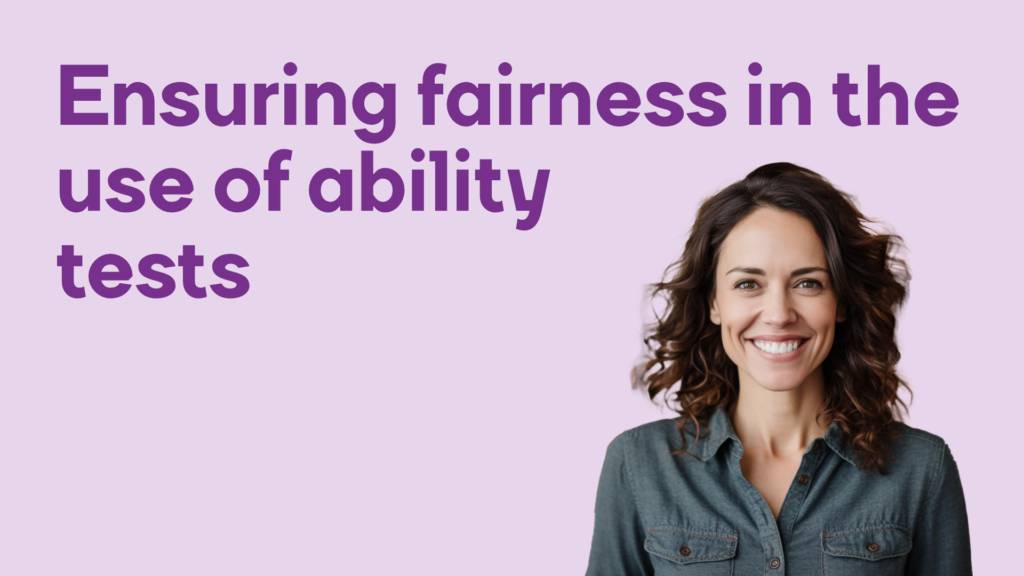The fair use of psychometric instruments relies heavily on how they are implemented. This article provides recommendations and best practice guidelines for HR professionals and recruiters to ensure fairness in the selection and administration of ability tests.
By following these guidelines, you can create a more equitable assessment process that considers the diverse needs of candidates while identifying the most suitable individuals for job roles.

Conducting job analysis:
Utilise job analysis techniques to establish a clear connection between job requirements and the demands of the assessment. Employ a variety of methods to gain detailed insights into job-related tasks, responsibilities, and the performance expectations for each role. This analysis should help identify the attributes of a strong performer, a mediocre performer, and a weak performer in the specific position.
Choosing the appropriate test:
Select cognitive ability tests that closely align with the specific job role. Consider the level of detail required for assessing job-related content to ensure objectivity and fairness. Avoid poorly designed tests, as well as those that are too easy or too difficult for the candidates being evaluated. Additionally, verbal tests should match the language requirements of the job level, while non-verbal tests, such as numerical assessments, should be accessible regardless of verbal abilities.
Test administration best practices:
To promote fairness in the administration of tests, it is crucial to adhere to the following best practices:
Obtain informed consent:
Before commencing any assessment, ensure that every respondent provides informed consent. This consent should be based on a comprehensive understanding of the nature, purpose, and outcomes of the assessment.
Prevent cheating and impression management:
For high-stakes assessments, emphasise the importance of honest responding in the test administration instructions. Reinforce the message that cheating, collusion, or impression management is not acceptable and can undermine the integrity of the assessment process.
Maximise standardisation:
Given the challenges of remote assessments, provide clear guidance to respondents about appropriate conditions for test completion. Encourage candidates to take the assessment in a quiet and undisturbed environment, ideally in a single sitting, and on a suitable device. For optimal results, recommend that ability tests be taken on a laptop or desktop rather than a mobile device.
Corroborating results:
Following the assessment, it is essential to corroborate the results with additional information. Take steps to validate the candidate’s responses at a subsequent stage of the assessment process. While corroboration may not be practical or possible for all test-takers, it is vital to avoid making decisions based solely on psychometric assessment results.
Utilising test results:
Consider these two approaches for using test results effectively:
Establishing a minimum cut-off:
Implement a minimum cut-off score to deselect candidates who do not meet the job requirements based on their test performance.
Holistic candidate evaluation:
Combine the outcomes of objective ability tests with other selection techniques, such as interviews, application forms, and personality questionnaires. This holistic approach provides a more comprehensive picture of each candidate’s suitability for the role.
Addressing the ‘chill factor’:
Be attentive to potential withdrawal of candidates due to anxiety or pessimism during the selection process. Pay specific attention to whether individuals from different gender or ethnic groups are more likely to withdraw.
To mitigate this, provide candidates with detailed information about the assessment process, including the specific test being used, its purpose, and how the results will be utilised. Consider offering feedback to candidates through telephone or face-to-face sessions conducted by trained personnel, allowing them to seek clarification, express concerns, and resolve any ambiguities.
Monitoring adverse impact:
Regularly monitor job applicants’ demographic data, such as gender, ethnicity, and age, to assess equal opportunities and maintain an overview of the assessment process. By closely tracking this data, you can identify and rectify any potential adverse impact.
Positive action training:
In cases where a particular gender or ethnic group experiences disproportionate rejection, investigate the fairness of your methods. Consider implementing positive action initiatives, such as training programs that enhance candidates’ abilities to handle stress, time pressure, comprehension of instructions, and attention to detail.
To conclude, by adopting these practices, HR professionals and recruiters can better enhance the fairness and effectiveness of their cognitive ability tests. Striving for fairness not only ensures more equal opportunities for all candidates but also enables recruiters to identify the most qualified individuals for each role.
View the output from our ability tests by downloading a sample report below.



